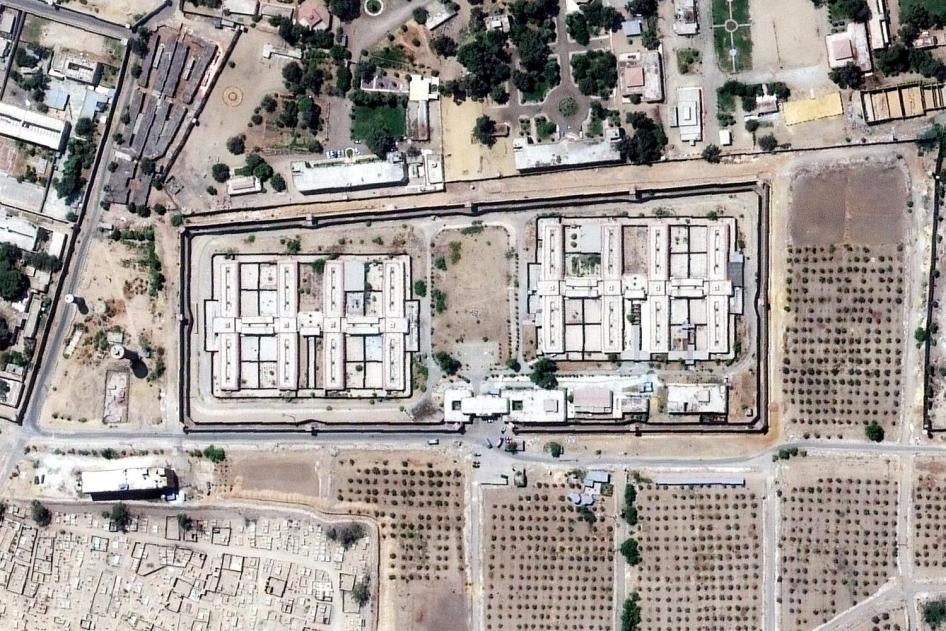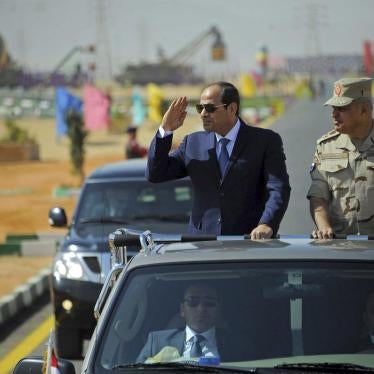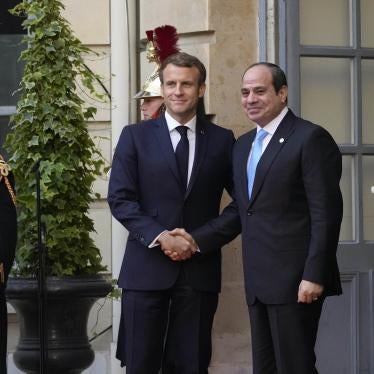On October 28, Egypt’s Interior Ministry released a slick, heavily produced video showcasing a new state-of-the-art prison mega-complex. The Wadi El Natrun Correctional and Rehabilitation Center complex is supposed to replace 12 prisons that currently hold 25 percent of the country’s total estimated prison population of 114,000 – tens of thousands of them political prisoners, held in endless pre-trial detention or following grossly unfair trials.
The video’s caricature of an idyllic rehabilitative life in Egypt’s prisons covers up a deeply sinister reality of Egypt’s abusive prison system, and is a crude attempt to erase the lived trauma of thousands of prisoners and their families.
Egyptian state media sycophantically praised the video, preposterously titled “The Right to Live,” while Egyptian human rights activists excoriated it on social media.
Scenes of beaming inmates in sparkling clean classrooms appear meant to counter the documented reality of an abusive penal system rife with systemic torture, pervasive medical neglect, and squalid facilities.
The video with its English subtitles seems part of the government’s broader public relations strategy in response to criticism from Egyptian civil society and in the UN Human Rights Council, and comes on the heels of President Abdel Fattah al-Sisi’s September announcement of a “National Strategy for Human Rights.” The video claims that Strategy is a “living reality” – but it’s unlike any reality actual prisoners in Egypt experience.
The video shows an array of restorative services, from state-of-the-art health facilities to classrooms offering art lessons and trade workshops, even on how to build solar panels, with perpetually smiling “inmates” sitting obediently in freshly pressed uniforms. This is in sharp contrast with the harrowing account given by Khaled Dawoud of his 19 months of pretrial detention in Cairo’s notorious Tora prison. Dawoud, a journalist and former head of Egypt’s Constitution Party, wrote in July that all he was given to wear in detention was a single dirty prison suit.
The video depicts family members easily booking prison visits online. Prison authorities in real life prevent some family visits for years, particularly for political prisoners. The new prison’s remote location actually makes it more difficult for families or lawyers to visit. The prison is far from any population centres and beyond easy access to public transportation.
The video showcases a fully staffed prison hospital “equipped with the most recent medical technologies,” a portrait that implicitly acknowledges the systemic medical neglect experienced by many Egyptian prisoners. Former president Mohamed Morsy died in 2019 after years of medical neglect in prison.
In July 2021, the family of 69-year-old Abd al-Moniem Abu al-Fotouh, an unjustly detained political leader, reported that he experienced heart attack symptoms in solitary confinement in Tora prison. Although he knocked on his cell door for hours, guards ignored him.
The Wadi El Natrun video pictures an array of recreational activities and “a library for developing cultural and intellectual skills.” All this is farcically incongruous with the prevailing routine denial of prisoners’ simplest requests, such as for books. The authorities have denied the detained activist Alaa Abdel Fattah access to reading and educational material for years.
This is not the Egyptian government’s first over-the-top propaganda effort related to its prisons. In 2019, in advance of the UN Human Rights Council’s Universal Periodic Review, a select group of Egyptian and foreign journalists were granted a tour of Tora prison. Journalists reported smelling freshly painted walls and observing suspiciously spontaneous football matches – yet were denied any opportunity to speak directly with prisoners, many of whom should never have been detained in the first place.
The Egyptian government’s broader public relations strategy is geared to muting criticism of its appalling human rights record. The video shows that the government cares about criticism but prefers to try and silence it through cosmetic, if costly, interventions rather than genuinely commit to acknowledge and address the pervasive repression in the country. It would be nice to think that prisoners really will get visitors and books, and not be tortured for that matter, but if the past is precedent, Egypt has no intention of treating its opponents any better.
Egypt’s allies should change course and take long overdue action to push the authorities much harder, so that Egyptians get meaningful human rights reforms to the dire situation this video tries to cover up.










